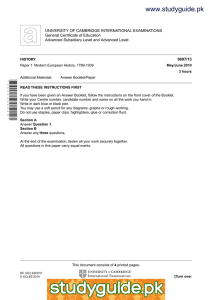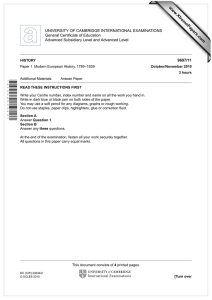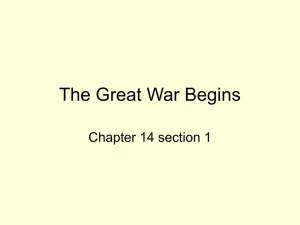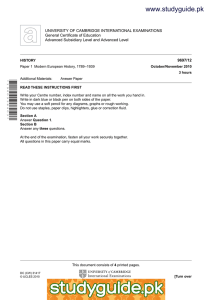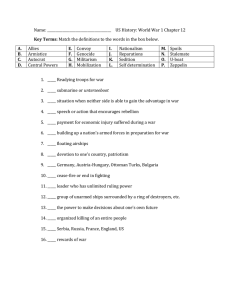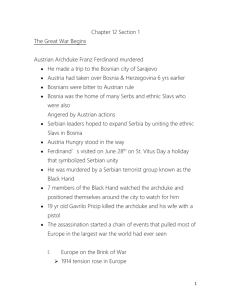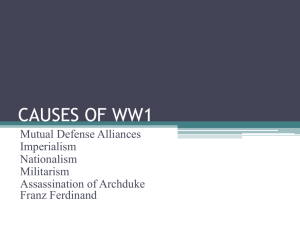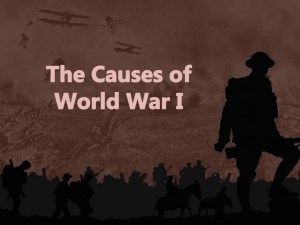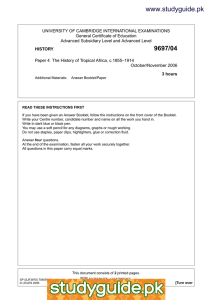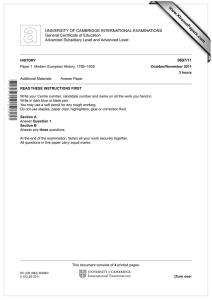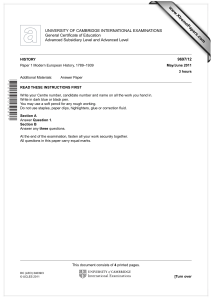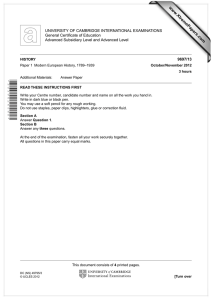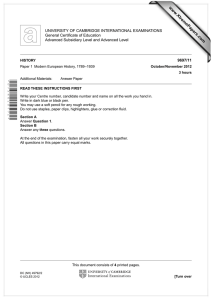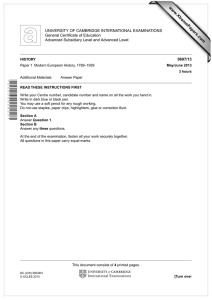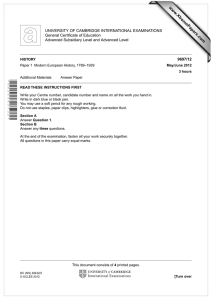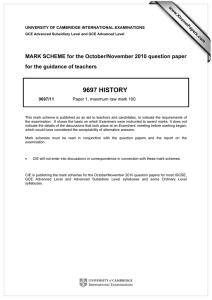www.XtremePapers.com
advertisement
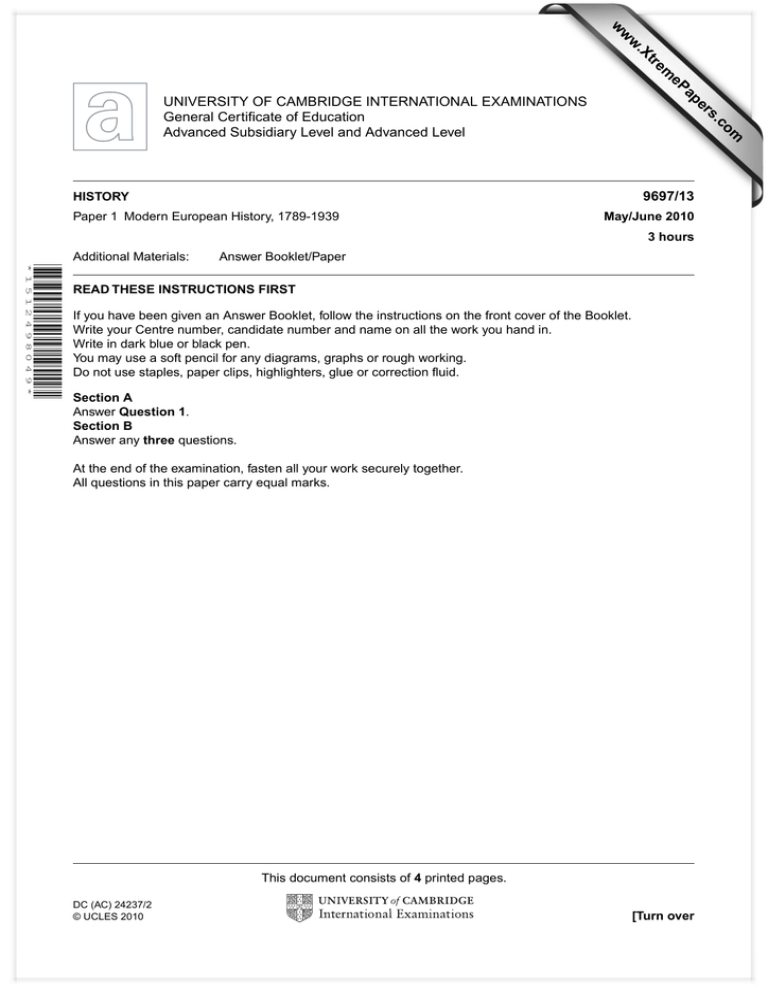
w w ap eP m e tr .X w om .c s er UNIVERSITY OF CAMBRIDGE INTERNATIONAL EXAMINATIONS General Certificate of Education Advanced Subsidiary Level and Advanced Level 9697/13 HISTORY Paper 1 Modern European History, 1789-1939 May/June 2010 3 hours Additional Materials: Answer Booklet/Paper *1512498049* READ THESE INSTRUCTIONS FIRST If you have been given an Answer Booklet, follow the instructions on the front cover of the Booklet. Write your Centre number, candidate number and name on all the work you hand in. Write in dark blue or black pen. You may use a soft pencil for any diagrams, graphs or rough working. Do not use staples, paper clips, highlighters, glue or correction fluid. Section A Answer Question 1. Section B Answer any three questions. At the end of the examination, fasten all your work securely together. All questions in this paper carry equal marks. This document consists of 4 printed pages. DC (AC) 24237/2 © UCLES 2010 [Turn over 2 SECTION A: THE ORIGINS OF WORLD WAR I, 1870 – 1914 You must answer Question 1. THE OUTBREAK OF WORLD WAR I 1 Read the Sources, and then answer the question. When answering Question 1, candidates are advised to pay particular attention to the interpretation and evaluation of the Sources both individually and as a group. Source A I feel sure that Europe would profit from the policies of some French politicians who have moderate opinions. Poincaré, the President of France, and his supporters have created and pushed the current policies of extreme nationalism and militarism. I believe that they are the greatest threat to the peace of Europe today. Baron Guillaume, Belgian Ambassador to France, report to his government, early 1914. Source B Kaiser William II and also everybody else in authority in Germany are not only firm allies of Austria but are also encouraging us vigorously not to neglect the present opportunity. Germany guarantees its complete loyalty and assistance. The Kaiser and all people in authority urge us to take action against Serbia which may eventually end in war. Germany is convinced that Russia is preparing for a war in the future against its western neighbours but not immediately. This is important. Russia intends waging a war but is not prepared for it at the moment. The German government believes that it has proof that Britain would not take part in a war caused by conflict in the Balkans, even if Russia and France were involved in it. The relations between Germany and Britain have improved so much that Germany does not need to fear a war with Britain. Britain now wants anything but war and would not expose itself to danger on behalf of Serbia or even for Russia’s sake. These are the reasons why Germany thinks this the perfect opportunity to settle relations with Serbia and stop Slav agitation for all time. Franz Joseph, the Emperor of Austria, is prepared to act with admirable energy where the vital interests and prestige of his country are concerned. Count Szögyény, Austrian Ambassador to Germany, report to Count Leopold Berchtold, Austrian Foreign Minister, 12 July 1914. Source C There can be no doubt that the murder of the Archduke Franz Ferdinand was planned with the involvement of the Serbian government and army. It was the result of Serbia’s ambitions to expand which, for a number of years, have been a lasting disturbance to Austria and to all Europe. Serbia’s reply to the demands of Austria proves that its rulers are not willing to depart from their previous policy or from plotting. Therefore, the Austrian government can do nothing, unless it is willing to cease to be a Great Power, but to enforce its demands by heavy pressure or, if necessary, by war. © UCLES 2010 9697/13/M/J/10 3 Russia believes that she must enter the dispute on behalf of Serbia, and she has a right to do so. But Russia must understand that, by being Serbia’s ally, she alone will be responsible if a European war results from the Austro-Serbian affair, which all other Great Powers wish to localise. Serbia’s most important aim is to destroy the Austrian monarchy, break up the Triple Alliance and isolate Germany completely. Therefore, our self-interest forces us to side with Austria. If the dispute in the Balkans between Austria and Serbia spreads and Russia interferes, we shall have to support Austria with all of Germany’s power. Gottlieb von Jagow, a senior German minister, message to German Ambassadors, 30 July 1914. Source D In spite of negotiations to agree a settlement which are still in the balance, and although, up to now, we ourselves have not taken any steps towards mobilisation, Russia has mobilised its whole army and fleet. This can only be against us. These Russian measures have forced us for the security of Germany to announce that there is an immediate danger of war. This does not yet mean mobilisation. But mobilisation must follow if Russia does not suspend all warlike measures against us and Austria within twelve hours. Official statement to Russia by the German government, 31 July 1914. Source E Men are reluctant to believe that great events have small causes. Therefore, once World War I started, they were convinced that it must be the outcome of profound forces. It is hard to discover these when we examine the details. Nowhere was there a conscious determination to provoke a war. Politicians miscalculated. They used the instruments of bluff and threat which had proved effective on previous occasions. This time things went wrong. The deterrent on which they relied failed to deter. The politicians became prisoners of their own weapons. The great armies, after they had been increased to provide security and preserve the peace, carried the nations to war by their own weight. The people of Europe rushed eagerly into war. Yet no country regarded it as a war of aggression. Every nation thought it was defending its existence, although the method of defence was to invade somebody else’s territory. There had been no war between the Great Powers since 1871 [the Franco-Prussian War]. No man younger than 40 knew what war was like. All imagined that it would be an affair of great marches and great battles, quickly decided. It would be over by Christmas. They were fighting to defend the French homeland, the German Fatherland, or Holy Russia. Only Britain went to war on behalf of another country - to defend the neutrality and independence of ‘little Belgium’. From a British history of World War I, published 1967. Now answer the following question. ‘No country engaged in a war of aggression.’ Use Sources A-E to show how far the evidence confirms this statement about the outbreak of World War I. © UCLES 2010 9697/13/M/J/10 [Turn over 4 SECTION B You must answer three questions from this section. 2 ‘The most important problem of the French ancien régime was poor quality leadership.’ How far do you agree with this judgement? 3 Assess the claim that the most important reason for the development of the Industrial Revolution in the nineteenth century was the contribution of capitalists. (You should refer to developments in at least two of Britain, France and Germany in your answer.) 4 Why was it that Prussia unified Germany? 5 Assess the results of ‘New Imperialism’ for Europe in the late nineteenth century. 6 Why was the revolution in February 1917 more dangerous for Nicholas II’s government than the revolution in 1905? 7 How accurately can Hitler’s government of Germany from 1933 to 1939 be described as ‘totalitarian’? 8 Who did more to establish communism in Russia during the period from 1917 to 1939: Lenin or Stalin? Copyright Acknowledgements: Question 1 Source E © A J P Taylor; The First World War, An Illustrated History; Penguin; 1967. Permission to reproduce items where third-party owned material protected by copyright is included has been sought and cleared where possible. Every reasonable effort has been made by the publisher (UCLES) to trace copyright holders, but if any items requiring clearance have unwittingly been included, the publisher will be pleased to make amends at the earliest possible opportunity. University of Cambridge International Examinations is part of the Cambridge Assessment Group. Cambridge Assessment is the brand name of University of Cambridge Local Examinations Syndicate (UCLES), which is itself a department of the University of Cambridge. © UCLES 2010 9697/13/M/J/10
